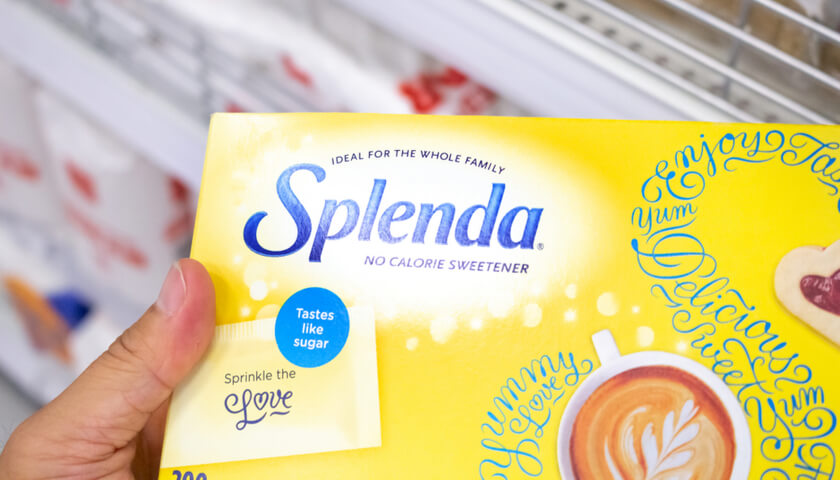Does Splenda Break a Fast? Important Facts
Splenda is a non-nutritive sweetener that contains zero calories, making it a popular choice for those looking to reduce sugar intake. But does consuming Splenda break a fast? In this article, we will explore the scientific evidence and different viewpoints on whether Splenda can disrupt the benefits of fasting.

When it comes to eating healthy, one of the first things we’re told is to cut out all the excess sugar from our diets. Instead, we’re offered c to help make our tea, coffee, and drinks taste sweet.
In particular, Splenda is a popular choice for artificial sweeteners. But can you have Splenda during your fasting period and not break your fast?
Our experts in intermittent fasting take a look at Splenda, artificial sweeteners, and how they go together with intermittent fasting.
Does Splenda Break a Fast?
While consuming sucralose alone won’t break your fast, the other ingredients in Splenda will cause both a GI and an insulin response by raising your blood glucose levels. This means that when you use Splenda to sweeten your tea or black coffee, you’re breaking your fast.
What Is Splenda?
Splenda is a brand of artificial sweetener found worldwide, and it is often used as a sugar substitute in lower-calorie foods instead of table sugar. Sugar substitutes are trendy in foods marketed towards people on a diet and can be found in diet sodas, zero-calorie treats, and sugar-free candy.
Splenda is made from sucralose, which is different from other sweeteners in that it’s made from sugar. However, sucralose has a different chemical structure than sugar, which means that your body isn’t recognizing it as a carbohydrate.
Sucralose is incredibly sweet, up to 600 times sweeter than regular sugar. With sucralose, Splenda has managed to make a sweetener that is just as sweet as sugar – and calorie-free.
Which Sweeteners Can You Consume While Fasting?
If you’re not a fan of unsweetened tea or black coffee, you may be wondering what sweeteners you can have while still sticking to your fasting regimen.
Here are some of the best sweeteners that you can have to soothe that sweet tooth.
#1 Stevia
Stevia is an excellent choice for those who are fasting. This sweetener is known for improving your insulin sensitivity, as well as reducing your blood glucose response. Stevia is also not absorbed by the GI tract, which means that whether you’re fasting for weight loss or gut health, you’re good to go.
#2 Monk fruit
Monk fruit is one of many natural sweeteners that is both calorie-free and carb-free. This sweetener is about 250 times sweeter than table sugar, making it one of the best sweeteners on the market. However, go easy if you’re fasting for weight loss – monk fruit may produce a mild insulin response if taken in large quantities.
#3 Allulose
Allulose is a reasonably new sweetener on the market. It’s known as a “rare sugar” in that it’s only found in small quantities out in nature. This sweetener doesn’t trigger an insulin response or stop ketosis. It’s great if you’re fasting for weight loss, but avoid it if you’re fasting for gut rest: about 70% of allulose is absorbed by the gut!
#4 Erythritol
Erythritol is a sugar alcohol with a similar chemical structure (but still different!). The caloric intake of erythritol is so minimal that it doesn’t break a fast for weight loss. However, you want to be careful if you’re trying to fast for gut rest because 90% of this sugar alcohol is absorbed in the gut.
#5 Xylitol
Another one of the sugar alcohol, xylitol, is one of the most common artificial sweeteners, well known for being in sugar-free gum and sugar-free candy. While it does not break a fast, you want to be careful with consuming too much, as large quantities could cause an insulin response.
A Word From Our RD
Intermittent fasting is one of the best ways to promote fat loss, metabolic health, better insulin levels, reduced insulin resistance, gut rest, and more. Common sweeteners for a zero-calorie drink may seem like the right way to go, but you may be messing up your gut microbiome without even knowing it!
If you’re looking to help with weight gain issues, always make sure to talk with your doctor before going on a new diet or lifestyle change. Fasting has incredible benefits, but it isn’t for everyone. Restricted eating could flair up eating disorders or cause issues with your blood sugar.
For non-sugar sweeteners, always look for sugar alcohols and natural sweeteners! Artificially made sweeteners, like the ones found in diet soda, have a habit of causing more harm than good, even if they have zero calories.
Conclusion
So, does Splenda break a fast? Whether you’re fasting for weight loss or gut health, Splenda is going to cause a break in your fast. But, don’t worry. If Splenda was your go-to sweetener, we’ve provided a list of sweeteners that are safe for intermittent fasting.
When looking for your next sugar substitute, natural sweeteners and sugar alcohols are always best. Whether it’s for metabolic health, keeping control of your blood sugar, or even encouraging healthy gut bacteria, these sweeteners aren’t likely to cause insulin spikes nor disrupt your gut rest.

















































 Select your language:
Select your language: 








